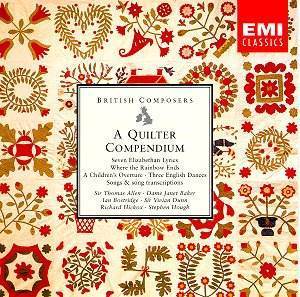A Quilter compilation
is always welcome - this one especially
so, since it includes instrumental and
orchestral items as well as songs. As
usual with these EMI collections, it
is a mix of previous releases dating
between 1965 and 1991. (In passing’
I commend the albums devoted to Quilter
songs produced by Hyperion, Chandos
and the now defunct Collins Classics
but freshly released by Naxos. review)
Quilter’s light music
enchants and perhaps none more so than
his A Children’s Overture.
It was originally intended as the overture
to Where the Rainbow Ends (1911)
but Quilter set it aside and returned
to it later in the decade. It was inspired
by A Baby’s Opera by Walter
Crane, an attractively illustrated collection
of nursery rhymes with music. Quilter
weaves a number of these into this attractive
overture, full of nostalgic charm. Dunn
responds with a very sympathetic rendering
and how the Light Music Orchestra joyfully
responds with some especially beautifully
delicate phrasing from the woodwinds.
From his incidental
music for the Edwardian nostalgic stage
play Where the Rainbow Ends Quilter
created a suite that described the characters
and scenes in the story. The play was
premiered on 21 December 1911 and became
a firm family Christmas favourite in
most years until 1959 – a reflection
on our too materialistic times? Richard
Hickox and the Northern Sinfonia capture
all the suite’s enchanting magic without
allowing the music to become cloyingly
sentimental. The lovely ethereal, pastoral
‘Rainbow Land’ opens the suite followed
by the gossamer light and plaintive
‘Will o’ the Wisp’. For ‘Rosamund’ (the
play’s heroine) Quilter writes one of
his most beautiful, slow-dreamy melodies,
speaking so eloquently of the little
girl’s fortitude and yearning for her
lost parents. ‘Fairy Frolic’ is just
that, light and frothy while ‘Goblin
Forest’ is an amusing, scary, well slightly
scary (this is a children’s play after
all), evocation. This performance is
way ahead of the somewhat stodgy Marco
Polo rival recording.
Still with the orchestral
items in this collection, Three English
Dances, a favourite of Percy Grainger,
were first performed at a Prom in June
1910. (Grainger quoted from the first
dance in his In a Nutshell Suite
[1916]). All three have that delicate
charm and sense of yearning and nostalgia
that is essentially Quilter.
Stephen Hough plays
his own sympathetic arrangements of
Weep you no more and Now sleeps
the crimson petal that in no way
diminish the grace and delicacy of the
original songs. He also adds his own
pellucid touch to Quilter’s own arrangement
of The Fuchsia Tree. Lovely.
To the songs. Singing
Shakespeare’s It was a lover and
his lass are both Dame Janet Baker
(with Gerald Moore); and, in a gorgeous
duet, Dame Felicity Lott and Ann Murray
(accompanied by Graham Johnson). Janet
Baker is also heard eloquently pleading
Shelley’s Love’s Philosophy.
Sir Thomas Allen, so sensitive to the
lines and colourings of Quilter songs
(his English songs Masterclass at the
Friends of Finzi weekend in Ludlow in
2001 was a very memorable experience)
sings the Seven Elizabethan
Lyrics: ‘Weep you no more’; ‘My
Life’s Delight’; ‘Damask Roses’; ‘The
Faithless Shepherdess’; ‘Brown is My
Love’; ‘By a Fountainside’ and ‘Fair
House of Joy’. Ian Bostridge (with Julius
Drake) plaintively sings Come away,
death and that Quilter favourite,
the hauntingly beautiful Now sleeps
the crimson petal. And that oaken-voiced
baritone, Frederick Harvey, enthusiastically
sings O mistress mine and another
Quilter favourite, Go, lovely rose.
Rounding off the compendium
is Quilter’s rousing setting of Non
nobis, Domine commissioned
by Walter Creighton for a Pageant
of Parliament, a grand entertainment
of Creighton’s devising mounted at London’s
Royal Albert Hall, London through the
greater part of July 1934. Quilter wrote
it for boys’ voices, four-part chorus
and chorus and orchestra. It is performed
here in an arrangement by Norman Richardson
for four-part chorus and wind band.
As with so many Quilter compositions,
Non nobis, Domine raises
a lump in one’s throats. As I said it
is rousing but there is also that unique
Quilter quality of sweet yearning and
nostalgia.
Alas a note of carping.
As usual with reissues, EMI choose to
be economical with their documentation,
too economical for there are no lyrics
printed.
A first rate compilation
of Quilter songs and light music. A
lovely nostalgic wallow; ideal for the
Christmas season. Wholeheartedly recommended
Ian Lace

